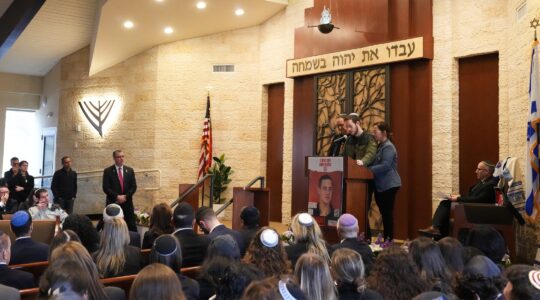ROME, June 27 (JTA) Polish Jews plan to hold their own ceremony in Warsaw’s synagogue next month to commemorate the 1,600 Jews massacred in 1941 by their Catholic neighbors in the village of Jedwabne.
“We will commemorate the victims, but also honor Catholic Poles who were then rescuing Jews in Jedwabne and the nearby towns of Radzilow and Wizna,” said Stanislaw Krajewski, a member of the board of the Union of Polish Jewish Congregations.
Krajewski said the July 6 ceremony was meant as a “complement, not a competition” to the official July 10 commemoration at Jedwabne, at which the state will unveil a controversial new monument at the site where Jedwabne’s Jews were tortured and burned to death in a barn.
Krajewski said negotiations were still under way concerning details of the July 10 ceremony and the inscription to be placed on the memorial.
Earlier this year, following revelations in a book by New York-based scholar Jan Gross that local Poles not the Nazis had carried out the Jedwabne massacre, Polish authorities removed a monument erected in the 1960s that blamed “Gestapo and Nazi soldiers” for the slaughter.
But the planned inscription for the new memorial angered Jews because it, too, appeared to cast blame for the massacre on the Nazis.
Relatives of Jedwabne victims said they were “shocked and appalled” by wording they called “so ambiguous that it can even be interpreted as an attack on the victims themselves.”
Two weeks ago, following such protests, the government again changed the wording, dropping a sentence that said the monument would stand “as a warning to future generations not to allow the sin of hatred spawned by German Nazism to ever again set the residents of this land against each other.”
The inscription will now read, in Polish, Hebrew and Yiddish: “In memory of the Jews of Jedwabne and surrounding areas, men, women, and children, fellow-dwellers of this land, murdered and burned alive at this site on 10 July 1941. Jedwabne, July 10, 2001.”
Jews still, however, feel the inscription is too ambiguous.
“We endorse the position taken by families of the victims,” Jewish writer Konstanty Gebert told JTA.
“The new abridged inscription is better than the old one, but if it is all that will be said, better not have an inscription at all.”
JTA has documented Jewish history in real-time for over a century. Keep our journalism strong by joining us in supporting independent, award-winning reporting.





